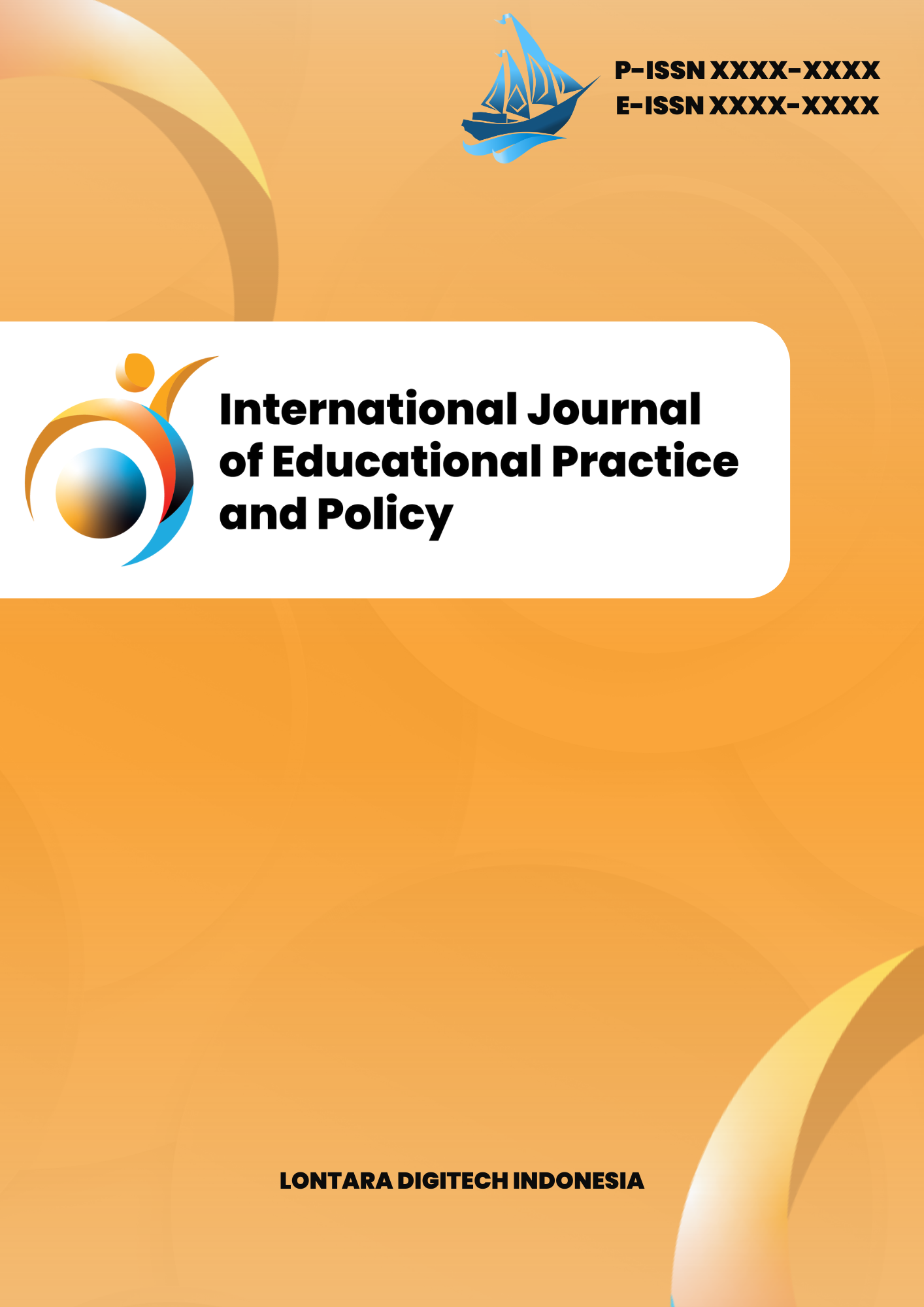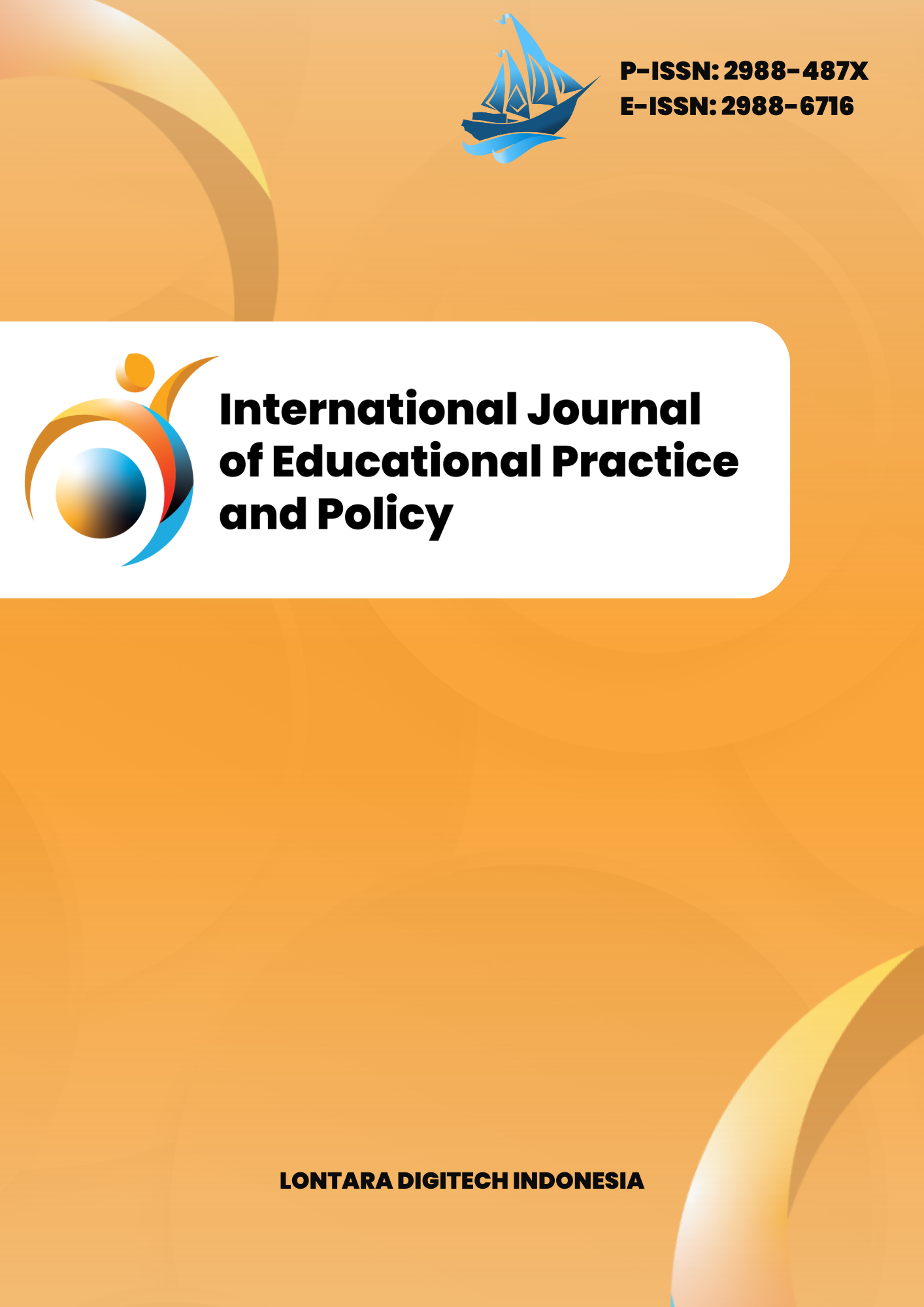Preschoolers’ Cognitive Profiles on Environmental Cleanliness: A Piagetian-Based Thematic Assessment of 6-Year-Olds
DOI:
https://doi.org/10.61220/Keywords:
Children’s Cognitive Development, Preoperational Development Stage, Environmental Cleanliness, Early Childhood Assessment, Piagetian TheoryAbstract
Environmental cleanliness is a socially relevant yet underexplored theme in early childhood cognitive development. While preschool education often introduces hygiene routines, little is known about how young children cognitively construct meaning around cleanliness. Most studies have focused on abstract academic domains like literacy and numeracy, while real-world issues remain marginal despite their potential to stimulate rich cognitive processes. This study investigates the cognitive profiles of six-year-old children on the theme of environmental cleanliness, grounded in Piaget’s theory of the preoperational stage. It explores how children demonstrate development across four domains including symbolic thinking, memory, language use, and imagination. A thematic assessment instrument was developed and validated through expert review, comprising 13 observable indicators. Data were collected through structured observation and guided interviews with seven children in three kindergartens in Medan, Indonesia. Findings revealed that most participants were categorized as established in memory and language use, indicating strong recall and verbal explanation of cleanliness routines. However, symbolic thinking and imagination remained in the developing range, particularly in tasks involving abstraction or causal reasoning. These results highlight the importance of contextualized, thematic assessment in revealing nuanced developmental patterns and underscore the need to foster symbolic and imaginative reasoning as part of early environmental education
References
Akhavan Tafti, M., Esmaeili, N., Piryaei, S., Mohamadzadeh, S., & Parvar, S. P. (2023). Self-Regulation and Social School Readiness in Preschoolers: An Analysis of Performance-Based Measures of Effortful Control and Executive Function. In Iranian Journal of Learning and Memory (Vol. 2023, Issue 20). https://dorl.net/dor/20.1001.1.26455447.2023.5.20.2.7
Aksoy Assist, P. (2019). HOW TO ASSESS SOCIAL EMOTIONAL LEARNING OF PRESCHOOL CHILDREN THROUGH DIFFERENT DECISION MAKING METHODS. European Journal of Education Studies, 6(7), 463–481. https://doi.org/10.5281/zenodo.3529826
Alwaely, S. A., Yousif, N. B. A., & Mikhaylov, A. (2021). Emotional development in preschoolers and socialization. Early Child Development and Care, 191(16), 2484–2493. https://doi.org/10.1080/03004430.2020.1717480
Collado, S., & Evans, G. W. (2023). Experiences in nature and childrens pro-environmentalism. In Handbook on Pro-Environmental Behaviour Change (pp. 78–95). Edward Elgar Publishing. https://doi.org/10.4337/9781800882133.00012
Cottini, M., Basso, D., & Palladino, P. (2021). Improving prospective memory in school-aged children: Effects of future thinking and performance predictions. Journal of Experimental Child Psychology, 204, 105065. https://doi.org/10.1016/j.jecp.2020.105065
Cowan, K., & Flewitt, R. (2023). Moving from paper-based to digital documentation in Early Childhood Education: democratic potentials and challenges. International Journal of Early Years Education, 31(4), 888–906. https://doi.org/10.1080/09669760.2021.2013171
Creswell, J. W. (2013). Qualitative Inquiry and Research Design: Choosing Among Five Approaches. SAGE Publication, Inc.
Creswell, J. W. ., & Poth, C. N. . (2018). Designing and Conducting Mixed Method Research (3rd ed.). SAGE.
Doernberg, E. A., Russ, S. W., & Dimitropoulos, A. (2021). Believing in Make-Believe: Efficacy of a Pretend Play Intervention for School-Aged Children with High-Functioning Autism Spectrum Disorder. Journal of Autism and Developmental Disorders, 51(2), 576–588. https://doi.org/10.1007/s10803-020-04547-8
Duan, J., Yan, R., Zare, S., & Qin, J. (2024). Exploring Children’s Reasoning about Continuous Causal Processes through Visual Cues and Non-Verbal Assessment in Science Education. Asia-Pacific Science Education, 10(1), 86–112. https://doi.org/10.1163/23641177-bja10076
Engler, J. R., & Alfonso, V. C. (2020). Cognitive Assessment of Preschool Children. In Psychoeducational Assessment of Preschool Children (pp. 226–249). Routledge. https://doi.org/10.4324/9780429054099-10
Eriksson, M. (2024). Enabling Children’s participation: Putting the ‘good dialogues’ model into practice. Children and Society, 38(2), 334–348. https://doi.org/10.1111/chso.12702
Evans, G. W. (2006). Child Development and the Physical Environment. Annual Review of Psychology, 57(1), 423–451. https://doi.org/10.1146/annurev.psych.57.102904.190057
Evans, G. W. (2021). The Physical Context of Child Development. Current Directions in Psychological Science, 30(1), 41–48. https://doi.org/10.1177/0963721420980719
Francis, G. A., & Gibson, J. L. (2023). A plausible role of imagination in pretend play, counterfactual reasoning, and executive functions. British Journal of Psychology, 114(3), 749–770. https://doi.org/10.1111/bjop.12650
Friman, H., Banner, I., Sitbon, Y., Sahar-Inbar, L., & Shaked, N. (2024). Nurturing Eco-Literate Minds: Unveiling the Pathways to Minimize Ecological Footprint in Early Childhood Education. Social Sciences, 13(4), 187. https://doi.org/10.3390/socsci13040187
Gashaj, V., Trninic, D., Chen, O., & Moeller, K. (2025). Beyond the page: Enriching storybooks with embodied activities to improve mathematics skills – A scoping review. Trends in Neuroscience and Education, 40, 100259. https://doi.org/10.1016/j.tine.2025.100259
Georgiou, G. K., & Zhang, L. (2023). Do Performance-Based Measures and Behavioral Ratings of Executive Functioning Complement Each Other in Predicting Reading and Mathematics in Chinese? Behavioral Sciences, 13(10), 823. https://doi.org/10.3390/bs13100823
Germeroth, C., Bodrova, E., Day-Hess, C., Barker, J., Sarama, J., Clements, D. H., & Layzer, C. (2019). Play it High, Play it Low Examining the Reliability and Validity of a New Observation Tool to Measure Children’s Make-Believe Play •. American Journal of Play, 11(2), 183–221.
Gerosa, A., Koleszar, V., Tejera, G., Gómez-Sena, L., & Carboni, A. (2021). Cognitive abilities and computational thinking at age 5: Evidence for associations to sequencing and symbolic number comparison. Computers and Education Open, 2, 100043. https://doi.org/10.1016/j.caeo.2021.100043
HALEK, D. Hi., Budijanto, S., & UTOMO, D. H. (2021). Examination Improving Character towards Environment Care Through Their Creativity and Innovation at School (A Case Study at the Senior High School 3 Ternate City). Eurasian Journal of Educational Research, 21(96). https://doi.org/10.14689/ejer.2021.96.6
Howard, S. J., & Vasseleu, E. (2020). Self-Regulation and Executive Function Longitudinally Predict Advanced Learning in Preschool. Frontiers in Psychology, 11. https://doi.org/10.3389/fpsyg.2020.00049
Kahriman-Pamuk, D., & Pramling Samuelsson, I. (2024). Nurturing Sustainability in Toddlerhood: Investigating Preschool Teachers’ Views and Daily Practices in a Swedish Preschool. Children, 11(12), 1412. https://doi.org/10.3390/children11121412
Kamber, E., Mazachowsky, T. R., & Mahy, C. E. V. (2023). The Emergence and Development of Future-Oriented Cognition in Toddlerhood: The Contribution of Cognitive and Language Abilities. Journal of Cognition and Development, 24(3), 397–419. https://doi.org/10.1080/15248372.2022.2149527
Kavaz, T., Kizgut-Eryilmaz, B., Polat, B., Amca-Toklu, D., & Erbay, F. (2021). Investigation of Preschool Children’s Perceptions to Protect the Environment Through Drawings. Theory and Practice in Child Development, 1(1), 41–55. https://doi.org/10.46303/tpicd.2021.4
Kit, O., Kilag, T., Ondog, J. D., & Kilag, T. (2024). A Constructivist Framework for Early Grade Numeracy: Drawing on Jean Piaget’s Cognitive Development Theory. International Multidisciplinary Journal of Research for Innovation, Sustainability, and Excellence, 1(5), 456–463.
Kızıldere, E., Aktan-Erciyes, A., Tahiroğlu, D., & Göksun, T. (2020). A multidimensional investigation of pretend play and language competence: Concurrent and longitudinal relations in preschoolers. Cognitive Development, 54, 100870. https://doi.org/10.1016/j.cogdev.2020.100870
Knowles, S. (2023). Understanding early cognitive development: Using PAT Early Years to support student learning. Research Conference 2023: Becoming Lifelong Learners. Proceedings and Program, 60–67. https://doi.org/10.37517/978-1-74286-715-1-21
Mahyuddin, N., Melindra, E., Nosarima, P., & Azzahra, R. (2024). Optimizing the Teacher’s Role in Assessment of Children’s Language Development in Accordance with the Merdeka Curriculum at Mekar Sari Preschool. International Journal of Emerging Issues in Early Childhood Education, 5(2), 30–36. https://doi.org/10.33830/ijeiece.v5i2.1616
Marulis, L. M., & Nelson, L. J. (2021). Metacognitive processes and associations to executive function and motivation during a problem-solving task in 3–5 year olds. Metacognition and Learning, 16(1), 207–231. https://doi.org/10.1007/s11409-020-09244-6
Meagher, B. R. (2020). Ecologizing Social Psychology: The Physical Environment as a Necessary Constituent of Social Processes. Personality and Social Psychology Review, 24(1), 3–23. https://doi.org/10.1177/1088868319845938
Migiro S, O., & Magangi B, A. (2011). Mixed methods: A review of literature and the future of the new research paradigm. African Journal of Business Management, 5(10), 3757–3764. https://doi.org/10.5897/AJBM09.082
Moriguchi, Y. (2014). The early development of executive function and its relation to social interaction: a brief review. Frontiers in Psychology, 5. https://doi.org/10.3389/fpsyg.2014.00388
Nawaz, M., Nizamani, M., Mehak, & Hameed, R. (2024). Analyze How Children Acquire Language and the Cognitive Processes Involved, including the Role of Environmental and Social Factors. Bulletin of Business and Economics (BBE), 13(3), 239–247. https://doi.org/10.61506/01.00483
Nguyen, T. T. P. (2021). Storytelling and Imagination. In Storytelling Pedagogy in Australia & Asia (pp. 119–138). Springer Singapore. https://doi.org/10.1007/978-981-16-4009-4_7
Nobre, J. N. P., Morais, R. L. de S., Prat, B. V., Fernandes, A. C., Viegas, Â. A., Figueiredo, P. H. S., Peixoto, M. F., De Oliveira Ferreira, F., de Freitas, P. M., Mendonça, V. A., & Lacerda, A. C. R. (2023). Environmental opportunities facilitating cognitive development in preschoolers: development of a multicriteria index. Journal of Neural Transmission, 130(1), 65–76. https://doi.org/10.1007/s00702-022-02568-4
Pelaez, M., & Monlux, K. (2020). Early Child Learning of Social and Cognitive Skills. In The Encyclopedia of Child and Adolescent Development (pp. 1–22). Wiley. https://doi.org/10.1002/9781119171492.wecad072
Piaget, J. (1951). Play, Dreams and Imitation in Childhood (C. Gattegno & F. M. Hodgson, Trans.). Routledge and Kegan Paul Ltd.
Qin, Y., Yu, Q., & Qiu, T. (2025). A Longitudinal Study on the Influence of Parental Interaction on Preschool Children’s Cognitive Development: A Retrospective Analysis. Clinical Pediatrics. https://doi.org/10.1177/00099228251322607
Rivas, S. F., Saiz, C., & Ossa, C. (2022). Metacognitive Strategies and Development of Critical Thinking in Higher Education. Frontiers in Psychology, 13. https://doi.org/10.3389/fpsyg.2022.913219
Roslan, F., Selvam, L., Pandian, T., Abdul Rahman, M. N. Bin, & Motevalli, S. (2022). A Systematic Review on Physical, Cognitive, and Social-Emotional Development of Pre-Schoolers. International Journal of Academic Research in Progressive Education and Development, 11(2). https://doi.org/10.6007/IJARPED/v11-i2/13013
Rothstein, J. D., Buckland, A. J., Gagnier, K., Ochoa, M., Allen-Valley, A., Jivapong, B., Cabrera, L. Z., Leontsini, E., & Fisher, K. R. (2021). Assessing the play and learning environments of children under two years in peri-urban Lima, Peru: a formative research study. BMC Public Health, 21(108), 2–15. https://doi.org/10.1186/s12889-020-10119-3
Russ, S. W. (2021). Pretend Play. In The Cambridge Handbook of Lifespan Development of Creativity (pp. 40–55). Cambridge University Press. https://doi.org/10.1017/9781108755726.005
Salahodjaev, R. (2018). Is there a link between cognitive abilities and environmental awareness? Cross-national evidence. Environmental Research, 166, 86–90. https://doi.org/10.1016/j.envres.2018.05.031
Samuelsson, R. (2021). Environments for Imitation: Second-Language Use and Development Through Embodied Participation in Preschool Routine Activities. Journal of Research in Childhood Education, 35(1), 22–40. https://doi.org/10.1080/02568543.2020.1734121
Scalise, N. R., & Ramani, G. B. (2021). Symbolic Magnitude Understanding Predicts Preschoolers’ Later Addition Skills. Journal of Cognition and Development, 22(2), 185–202. https://doi.org/10.1080/15248372.2021.1888732
Schonert-Reichl, K. A., Guhn, M., Gadermann, A. M., Hymel, S., Sweiss, L., & Hertzman, C. (2013). Development and Validation of the Middle Years Development Instrument (MDI): Assessing Children’s Well-Being and Assets across Multiple Contexts. Social Indicators Research, 114(2), 345–369. https://doi.org/10.1007/s11205-012-0149-y
Sun, L., Yang, S., Li, S., & Zhang, Y. (2020). Does education level affect individuals’ environmentally conscious behavior? Evidence from Mainland China. Social Behavior and Personality: An International Journal, 48(9), 1–12. https://doi.org/10.2224/sbp.8488
Swirbul, M. S., Shahnooshi, M., Ho, R., & Tamis-LeMonda, C. S. (2024). Math Talk to Infants During Everyday Home Activities: Contextual Cues to Words About Number, Space, and Magnitude. Journal of Cognition and Development, 25(4), 463–486. https://doi.org/10.1080/15248372.2024.2338725
Too Small to Fail. (2024). Climate Change and Early Childhood: A Science-Based Resource for Storytellers.
Torras Vila, B. (2021). Music as a tool for foreign language learning in Early Childhood Education and Primary Education. Proposing innovative CLIL Music teaching approaches. CLIL. Journal of Innovation and Research in Plurilingual and Pluricultural Education, 4(1), 35. https://doi.org/10.5565/rev/clil.60
Vygotsky, L. S. (1978). Mind in Society: The Development of Higher Psychological Processes (M. Cole, V. John-Steiner, S. Scribner, & E. Souberman, Eds.). Harvard University Press.
White, R. E., & Carlson, S. M. (2021). Pretending with realistic and fantastical stories facilitates executive function in 3-year-old children. Journal of Experimental Child Psychology, 207, 105090. https://doi.org/10.1016/j.jecp.2021.105090
Wigglesworth, G., & Frost, K. (2017). Task and Performance-Based Assessment. In Language Testing and Assessment (pp. 121–133). Springer International Publishing. https://doi.org/10.1007/978-3-319-02261-1_8
Downloads
Published
Issue
Section
License
Copyright (c) 2025 Nina Afria Damayanti, Lindawati Elisabeth Nababan, Fakhira Azzahra Syarefi, Lisda Sinaga (Author)

This work is licensed under a Creative Commons Attribution-ShareAlike 4.0 International License.























 Email : ijepp@lontaradigitech.com
Email : ijepp@lontaradigitech.com